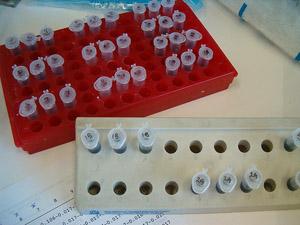Key finding in AIDS research
(Image: Flickr user jepoirrier (cc: by-nc-sa))
Scientists have long believed that the AIDS virus, HIV, evolved from a related virus that infects monkeys and chimpanzees. It’s called SIV for Simian Immunodeficiency Virus. Researchers had thought that SIV was relatively harmless, but it now turns out that infected chimpanzees in Africa are coming down with what is, in essence, AIDS. The research was done at Gombe National Park in Tanzania. That’s where Jane Goodall conducted her pioneering work with chimps.
Dr. Beatrice Hahn of the University of Alabama at Birmingham headed the current study. Her team followed the chimps for 10 years to see how those infected with SIV fared.
On "The World," Dr. Hahn said when her team compared the two groups of infected and uninfected chimps, they realized the mortality in the infected group was significantly increased.
This was surprising, said Dr. Hahn, "Because we assumed the opposite. We assumed that chimpanzees worked just like these other primate species, for which we had data that they don’t get sick. We found that infected chimps were 10 to 16 times more likely to die in any given year than uninfected ones."
She says this made her look at HIV infections in humans from a different angle.
"Obviously, chimps have it too, but they don’t have it quite as bad as humans, there must be a difference," said Dr. Hahn. "Chimpanzees must have evolved a different way to deal with their infection. Although at the end, some of them also dies prematurely or of AIDS. And, to just compare and contrast that will give us new insight in how HIV works in people.
"The good news is, it gives us new avenues to combat HIV one. There’s a great interest right now to look at genetic determinance in people that modulate how the disease comes about or doesn’t come about. There are people who progress very rapidly, and there are people who don’t progress at all. And people want to know what are the genetic determinance in the host that are responsible for that. And finally, perhaps chimps mount different types of immune responses. Perhaps more efficient neutralizing antibody responses that we could then utilize to make better vaccines for humans."
Beatrice Hahn’s study of an AIDS-like illness in African chimpanzees appears in this week’s issue of the journal "Nature."
PRI’s "The World" is a one-hour, weekday radio news magazine offering a mix of news, features, interviews, and music from around the globe. "The World" is a co-production of the BBC World Service, PRI and WGBH Boston.
